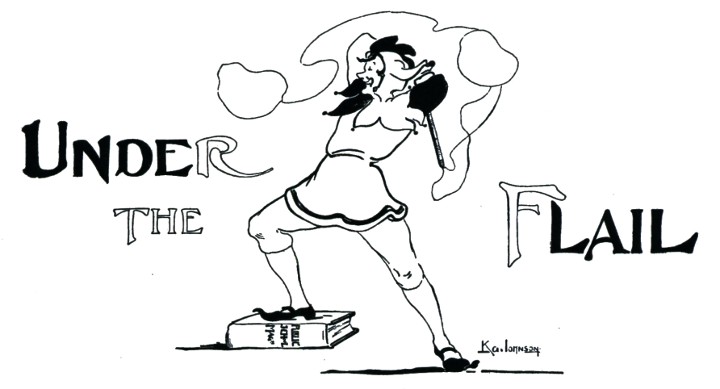
Public School Magazine, February 1901
I am told that, in the Merchiston-Loretto match, Anderson, of Loretto, did an enormous amount of stopping work. This has a great interest for me, as my own speciality is stopping work. Many people, whom I have served on the principle that “they also serve who only stand and wait,” have remarked with some fervour that I can probably stop work as quickly as anyone in England. They were the sort of people, too, who would die rather than express themselves in hyperbole, several of them being, indeed, political journalists.
King’s School, Canterbury, have set themselves the following problem to solve: “Are the publications of Messrs. Milton and Shakespeare preferable to those of Messrs. Harmsworth and Pearson”? and they argued it out as sich. Without for a moment disputing the value of “Paradise Lost” or “Hamlet” (both good enough works, after a fashion, for whiling away a wet afternoon, and both displaying a neat poetic vein in places), where, I ask, do they supply any really useful, practical information? It would be different if Shakespeare had told us whether Hamlet preferred soup to fish, or if Milton had given a clue as to which side Adam parted his hair. But they don’t, and it is with a feeling of relief that we return to our “Eyeglasses of Eminent Earls,” and “Beverages barred by Bishops,” and read once more those fascinating statistical articles on the subject of how many greengrocers of the name of Cholmondley there are likely to be in Ireland at the beginning of next century (illustrated with diagrams).
At Fettes the School library has this peculiarity, that the School are not allowed to use it. This is analagous to the case of the War Office, who, I am told, are remarkable for not being able to tell the difference between a war and a week-end trip to Margate.
A correspondent at Elizabeth College, Guernsey, writes telling me of the prize-giving. There is one sentence in his letter which is rather puzzling me. He says:—“The bailiff concluded with an anecdote of George I., to show that there was a chance for all.” Now, does he mean that, if a man capable of prolonging his address with an anecdote could rise to the position of bailiff, all things are possible to everybody, or would he imply that, if a monarch so far forgets himself as to supply the subject matter for an anecdote, it does not require much soundness of character to become a monarch? Both are probable. Suggestions will be welcomed.
“They don’t meet,” sighed a portly gentleman of my acquaintance to me the other day as I was seeing him through the trying ordeal of being measured for a new suit of clothes. He referred to the two ends of the tape-measure, between which a generous gulf yawned; but the same remark applies equally to the Games Committee at Tonbridge.
“They are members of a secret society,
Working by the moon’s uncertain disc.
Their motto is “Defiance to Propriety
Without, if may be, inconvenient risk!”
and the vox populi is saying bitter things about them.
Some day when I am a great and good man, when publishers flock round waving blank cheques in the air before me, to induce me to let them have my book, “Essays on the Probability that Thucydides was the Author of Shakespeare’s Plays,” when, in short, the name of Jack Point is as much a synonym for wealth as that of Rothschild, it is my intention to buy more cream-buns than human brain can compass, and wallow in them. But at Malvern the word cream-bun rouses no responsive thrill. They sneer at it, and jibe at it. I hear that a movement is being set on foot to reorganize the grub-shop, and do away with cream-buns altogether. Ah! how happy could I be—but not yet, not yet, my child. Be still, my palpitating heart.
There have been some interesting debates at Blairlodge lately. The proposal that China would never be conquered by the European Powers met with disapproval, the House opining that it was still another case of “Hardly ever” rather than never. They then sifted thoroughly the abstruse point as to whether an ostrich sitting on an hen’s egg is more ridiculous than a hen sitting on an ostrich’s egg. In the former case, surely, there would, properly speaking, be no egg after the ostrich had seated itself. It would be like that quip of Homer’s (or was it Adam’s?): “Appleton? Yes, nice young fellow, Appleton, but rash in his use of chemicals. You see that slight discolouration on the ceiling? That’s Appleton.”
Jack Point.
Notes:
they also serve who only stand and wait: Milton, On His Blindness
argued it out as sich: W. S. Gilbert, “The Yarn of the Nancy Bell”
members of a secret society: Adapted from W. S. Gilbert, The Mountebanks:
We are members of a Secret Society, (hush!)
Working by the moon’s uncertain disc,
Our motto is “Revenge without Anxiety”—
That is, without unnecessary risk.
“Hardly ever”: More Gilbert: the “What, never?” gag from the Captain’s self-introduction song in Act I of H.M.S. Pinafore
 Madame Eulalie’s Rare Plums
Madame Eulalie’s Rare Plums